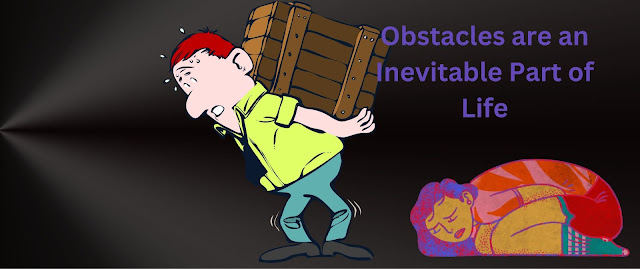TABLE OF CONTENT
- What do you mean by obstacles
- What is The Meaning of Obstacle in Life
- Why are Obstacles Important in Life
- What are the Four Obstacles in Life
- How to Overcome Obstacles
Introduction:
There are many obstacles or challenges in the life of every person, happiness and success come in life only if you can overcome them. Poverty, financial distress, relationship problems, social problems, physical problems, love breakup, marriage breakup, not getting or losing a job etc. are so called obstacles.
What do you mean by obstacles:
Obstacles are things that hinder or block progress or prevent a person from achieving a goal or desired outcome. They can be physical, mental, emotional, or situational barriers that make it difficult to accomplish something. Examples of obstacles might include limited resources, lack of knowledge or skills, physical disabilities, mental health challenges, negative attitudes, or difficult circumstances beyond one's control. Overcoming obstacles often requires persistence, creativity, observation skills and problem-solving skills, as well as the ability to adapt to changing circumstances and seek support and resources when needed.
What is The Meaning of Obstacle in Life:
Why are Obstacles Important in Life:
Obstacles are an inevitable part of life, and while they can be challenging and frustrating, they are also important. Here are some reasons why obstacles can be important in life:
- They help us grow and develop: Obstacles provide us with opportunities to learn and grow as individuals. They force us to think outside the box and develop new skills or ways of thinking to overcome them.
- They teach us resilience and perseverance: Overcoming obstacles requires a certain level of resilience and perseverance. When we face and overcome challenges, we build our mental strength and develop a sense of inner resilience.
- They give us a sense of accomplishment: Overcoming obstacles can give us a sense of accomplishment and confidence that we can tackle whatever life throws our way.
- They help us appreciate what we have: Obstacles can help us to appreciate the things we have in life and the people who support us through difficult times.
- They provide opportunities for creativity: Obstacles can inspire creativity and innovation as we look for new ways to approach problems and find solutions.
In summary, while obstacles can be difficult and frustrating, they are also important because they provide opportunities for growth, resilience, accomplishment, gratitude, and creativity.
What are the Four Obstacles in Life:
Obstacles are challenges or barriers that prevent or hinder progress or success in a particular endeavor. Obstacles can come in many forms, including:
Physical Obstacles in Life:
Physical obstacles in life can refer to any physical challenge or limitation that impedes or hinders an individual's ability to achieve their goals or engage in activities they desire. Some common examples of physical obstacles in life include:
- Illness or injury: This can range from temporary conditions such as the flu or a broken bone, to chronic or permanent conditions such as arthritis or paralysis.
- Age-related decline: As people age, they may experience physical limitations such as decreased mobility or vision impairment.
- Environmental barriers: This can include physical obstacles in the built environment such as stairs or narrow doorways, or natural obstacles like rough terrain or extreme weather.
- Limited access to resources: Individuals who lack access to resources like transportation or specialized equipment may face physical barriers to achieving their goals.
- Discrimination and stigma: Physical differences such as race, gender, or weight can lead to discrimination or stigma, creating physical obstacles in the form of social and emotional barriers.
Financial obstacles:
These are monetary barriers such as lack of funding, debt, or economic downturns that can make it difficult to achieve financial goals.
Financial obstacles refer to challenges or barriers that people face when it comes to managing their money and achieving their financial goals. These obstacles can take many forms, and they can affect people of all ages, income levels, and backgrounds.
Some common financial obstacles include:
- High levels of debt: Having a significant amount of debt can make it difficult to save money, invest, or achieve other financial goals.
- Low income or unemployment: When people are not earning enough money or do not have a job, they may struggle to pay their bills, save money, or invest.
- Lack of financial education: Many people do not have a solid understanding of personal finance, which can make it challenging to make smart decisions about money.
- Unexpected expenses: Large, unexpected expenses such as medical bills or car repairs can throw people's budgets off balance and make it difficult to save or invest.
- Poor credit history: A bad credit history can make it challenging to get approved for loans, credit cards, or other financial products, which can limit people's options.
- Impulsive spending: People who have a tendency to spend money impulsively may find it challenging to stick to a budget or save money.
- Lack of access to financial products and services: Some people may live in areas where there are few financial institutions or have limited access to financial products, which can make it challenging to manage their money effectively.
Mental obstacles:
Mental obstacles refer to the psychological barriers or challenges that prevent individuals from achieving their goals or pursuing their aspirations. These obstacles can be internal or external and can manifest in various forms such as fear, self-doubt, procrastination, negative self-talk, lack of motivation, perfectionism, lack of confidence, and so on.
Some common mental obstacles that people face include:
- Fear: Fear of failure, fear of rejection, fear of the unknown, etc.
- Self-doubt: Believing that you are not good enough or capable of achieving your goals.
- Procrastination: Putting off important tasks or goals and not taking action.
- Negative self-talk: Negative thoughts and beliefs about yourself that can undermine your self-confidence and motivation.
- Perfectionism: The believe that everything must be done perfectly, which can lead to anxiety and procrastination.
- Lack of motivation: Feeling uninspired or lacking the energy to pursue your goals.
Social obstacles:
These are cultural, social, or political barriers such as discrimination, prejudice, or systemic inequalities that can hinder progress for certain groups of people.
Social obstacles are challenges or barriers that individuals or groups face in their interactions with others or in their participation in society. These obstacles can take many forms and may arise from various sources, including cultural norms, attitudes, and beliefs; structural inequalities; and institutional policies and practices.
Some common examples of social obstacles include:
- Discrimination: When individuals or groups are treated unfairly or unjustly based on their race, gender, religion, sexuality, or other personal characteristics.
- Stereotyping: When people are judged or labeled based on preconceived notions or assumptions about their background, self-identity, or abilities.
- Prejudice: When individuals or groups are prejudged based on stereotypes or biases, leading to negative attitudes or actions towards them.
- Social exclusion: When individuals or groups are excluded from social activities, events, or networks, leading to feelings of isolation, social anxiety or loneliness.
- Inequality: When individuals or groups are disadvantaged or marginalized due to economic, social, or political factors.
- Stigmatization: When individuals or groups are labeled or associated with negative traits or behaviors, leading to social disapproval or discrimination.
How to Overcome Obstacles:
Any obstacle can defeat you only when your strength is less than that!
Whenever you increase your power the obstacles will be disappeared automatically. You can gain power from two resources 1) External resources 2) Internal resources.
But you do not have direct and complete control over any of the external resources ie money, manpower, relationships, jobs, society, environment.
So what should we do? Internal resources must be sought for, they must be stimulated. The resource of internal power is our mind and body.
There are several strategies you can use to help you navigate these obstacles:
Develop a positive mindset:
Cultivate a positive and optimistic mindset to help you face obstacles with a hopeful outlook. Try to focus on the positive aspects of your life and remind yourself of your strengths and accomplishments.Seek support:
Reach out to your support network for help and guidance during difficult times. This could be friends, family, relatives, a therapist or counselor, or a support group.Take action:
Take concrete steps towards overcoming your obstacles. This could mean breaking down larger goals into smaller, manageable steps or seeking out resources and information that can help you move forward.Practice self-care:
Make sure to take care of yourself physically, mentally, and emotionally. This could include getting enough sleep, eating well, exercising, and taking time for activities you enjoy.Learn from your experiences:
View obstacles as opportunities for growth and learning. Reflect on what you have learned from past challenges and use this knowledge to help you face future obstacles with greater resilience and self-confidence.Overcommeng Financial Obstacles:
Overcoming Mental Obstacles:
Overcoming social obstacles:
Remember, overcoming life obstacles is a process and it may take time, effort, and patience. Be kind to yourself and celebrate even small victories along the way.














0 comments:
Post a Comment
Thank you for your response